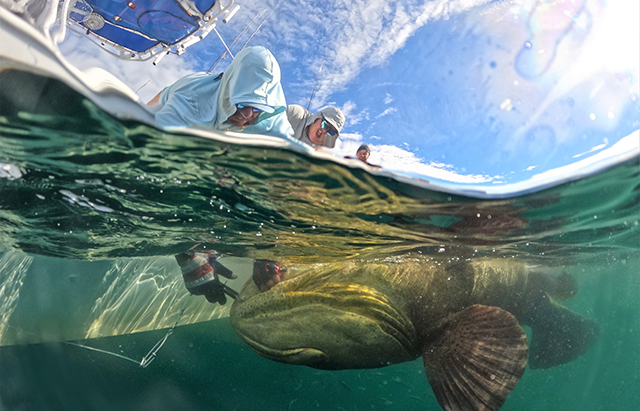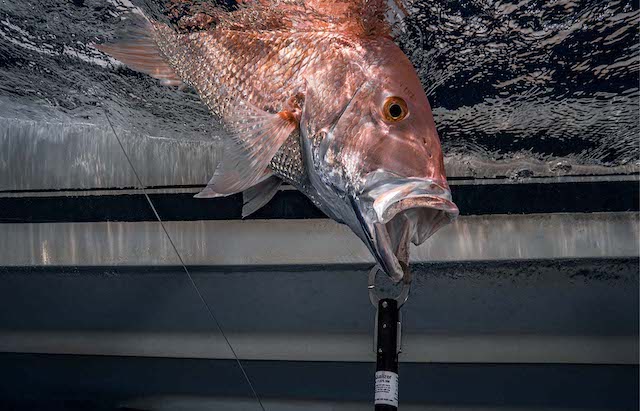
The winning photo showcases a Goliath grouper being released using a descending device called a SeaQualizer.
After over 30 years of protection, the Goliath grouper will have a limited recreational season in Florida state waters beginning in spring of 2023. With this regulation change on the horizon, fisheries scientists with the University of Florida and Florida Atlantic University are working with industry partners to develop oversized barotrauma mitigation tactics that are effective and realistic for large reef fish, including Goliath grouper.
The project, funded by Florida Sea Grant, is testing “supersized” barotrauma mitigation tools and techniques that will allow large fish to overcome the negative effects of barotrauma, like excess buoyancy caused by expanded gas trapped within the fish. A photo captured during a project outing by team member Mike Sipos, with Florida Sea Grant UF/IFAS Extension, was recently selected as a “Sustainability in Action” finalist in the American Geosciences Institute’s Earth Science Week Photography Contest.
“To ensure our fisheries are sustainable, we must do our best to reduce mortality associated with angling which can greatly increase if fish affected by barotrauma are released floating and untreated,” Sipos states in his photo contest submission. “Giving anglers the tools and tricks to practice effective catch and release is paramount for sustainable reef fish fisheries.”
“Giving anglers the tools and tricks to practice effective catch and release is paramount for sustainable reef fish fisheries.”
Mike Sipos

Photo courtesy of Return ‘Em Right
Barotrauma is a pressure-related injury that some fish can experience when reeled up from depth caused from gas expansion inside the fish as the surrounding water pressure decreases and swim bladder volumes increase. Symptoms of barotrauma can manifest in several ways and can vary in intensity depending on the size, species and depth the fish was caught in. One very noticeable and negative symptom of barotrauma is a fish floating on the surface unable to swim back to depth on its own, leaving fish left floating on the sea’s surface and subject to being eaten by predators or suffocation.
The 2022-24 Florida Sea Grant-funded research project is a collaboration between partners at University of Florida, Florida Atlantic University, Florida Sea Grant and Return Em’ Right. The project is led by principal investigators Dr. Angela Collins, UF/IFAS Florida Sea Grant multi-county agent, and Dr. Matt Ajemian, associate research professor at Florida Atlantic University (FAU)’s Fisheries Ecology and Conservation Lab, with support from FAU Ph.D. student Clark Morgan.
To learn more about responsible deep-water release and what anglers can do to help reef fish “earn another fight” after barotrauma, check out Return Em’ Right. Enroll in the free Florida Friendly Angler Program to learn more information on best fishing practices, environmental ethics and fisheries management.
For more information about the upcoming Goliath Harvest Program, visit Florida Fish and Wildlife Conservation Commision (FWC)’s website at: https://myfwc.com/fishing/saltwater/recreational/goliath/#harvest.